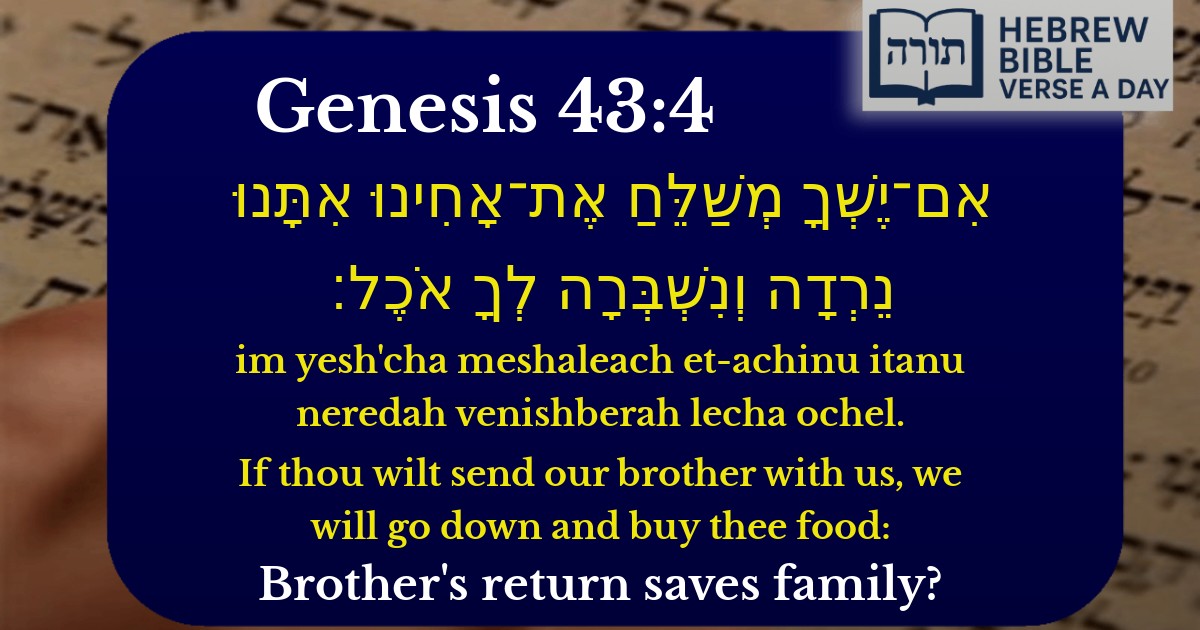Frequently Asked Questions
Q: What is the context of Genesis 43:4?
A: Genesis 43:4 is part of the story where Yosef's (Joseph's) brothers are speaking to their father Yaakov (Jacob) during a famine. They had already been to Egypt once to buy food, and Yosef (who they did not recognize) demanded they bring their youngest brother Binyamin (Benjamin) next time. Here, the brothers are explaining to Yaakov that they cannot return to Egypt for more food unless Binyamin comes with them.
Q: Why did Yosef insist on seeing Binyamin?
A: According to Rashi and other commentaries, Yosef wanted to see if his brothers still harbored jealousy toward Rachel's children (Binyamin was Yosef's only full brother). By seeing how they treated Binyamin, he could test whether they had repented for how they treated him years earlier. Additionally, the Midrash suggests Yosef wanted to fulfill his prophetic dreams where all his brothers bowed to him.
Q: What lesson can we learn from this verse about family relationships?
A: This verse teaches the importance of family unity and responsibility. Despite past conflicts, the brothers now show concern for both their father Yaakov and their youngest brother Binyamin. The Talmud (Sanhedrin 101b) emphasizes that family harmony is foundational, and this story shows the beginning of reconciliation between Yosef and his brothers.
Q: Why does the verse say 'we will go down' to Egypt?
A: Rashi explains that the phrase 'we will go down' hints at their humility in this situation. Egypt was geographically lower than Canaan, but it also symbolizes a spiritual descent - leaving the holy land of Israel for a place of impurity. The brothers understood this was necessary to sustain their family during the famine, showing practical wisdom in difficult times.
Q: How does this verse connect to the theme of repentance (teshuva)?
A: The Rambam teaches that true repentance requires being tested in the same situation where one previously failed. Here, the brothers are being tested with another 'favored' brother (Binyamin), just as they had failed with Yosef. Their protective attitude toward Binyamin shows their growth and repentance for how they treated Yosef years earlier.


Context of the Verse
The verse (Genesis 43:4) is part of the narrative where Yosef's brothers return to Egypt to purchase food during the famine. Yehudah speaks to Yaakov, insisting that Binyamin must accompany them to Egypt, as Yosef (still unrecognized by them) had demanded. The brothers are hesitant to return without Binyamin, as Yosef had imprisoned Shimon as collateral.
Rashi's Commentary
Rashi explains that Yehudah's phrasing "אִם־יֶשְׁךָ מְשַׁלֵּחַ" ("If thou wilt send") implies a conditional plea. Yehudah is not demanding but respectfully requesting Yaakov's permission, recognizing his father's authority. Rashi also notes that the brothers emphasize "אָחִינוּ" ("our brother") to evoke Yaakov's compassion, reminding him that Binyamin is their shared family responsibility.
Ibn Ezra's Insight
Ibn Ezra highlights the brothers' commitment to their mission: "נֵרְדָה וְנִשְׁבְּרָה לְךָ אֹכֶל" ("we will go down and buy thee food"). The use of "for you" (לְךָ) underscores their dedication to providing for their father, showing their repentance for earlier failures (e.g., the sale of Yosef). Their focus is now on familial unity and care.
Midrashic Interpretation (Bereshit Rabbah)
The Midrash emphasizes the brothers' changed demeanor. Earlier, they had callously sold Yosef, but now they act with humility and responsibility. The phrase "נֵרְדָה" ("we will go down") hints at their descent into Egypt as a necessary step toward teshuvah (repentance) and the eventual reunification of the family.
Rambam's Ethical Lesson
Rambam (Hilchot Teshuvah 2:1) derives from this episode that true repentance requires confronting past mistakes in similar circumstances. The brothers, who once abandoned a sibling, now insist on protecting Binyamin—demonstrating growth and rectification of their earlier sin.
Key Themes